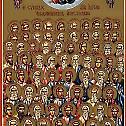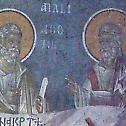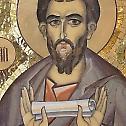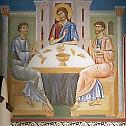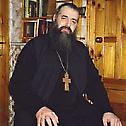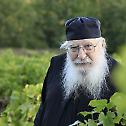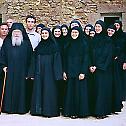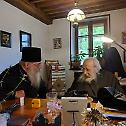Theology
St. Athanasius the Great the Patriarch of Alexandria
30. January 2018 - 16:54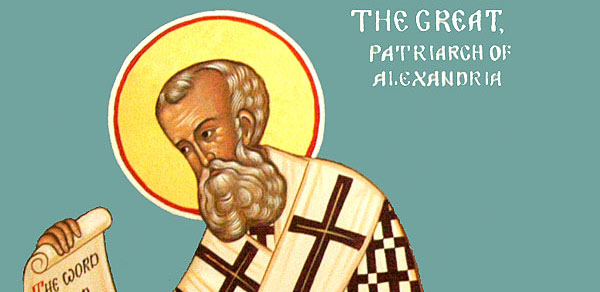 Saint Athanasius the Great, Archbishop of Alexandria, was a great Father of the Church and a pillar of Orthodoxy. He was born around the year 297 in the city of Alexandria into a family of pious Christians. He received a fine secular education, but he acquired more knowledge by diligent study of the Holy Scripture. In his childhood, the future hierarch Athanasius became known to Saint Alexander the Patriarch of Alexandria (May 29). A group of children, which included Athanasius, were playing at the seashore. The Christian children decided to baptize their pagan playmates.
Saint Athanasius the Great, Archbishop of Alexandria, was a great Father of the Church and a pillar of Orthodoxy. He was born around the year 297 in the city of Alexandria into a family of pious Christians. He received a fine secular education, but he acquired more knowledge by diligent study of the Holy Scripture. In his childhood, the future hierarch Athanasius became known to Saint Alexander the Patriarch of Alexandria (May 29). A group of children, which included Athanasius, were playing at the seashore. The Christian children decided to baptize their pagan playmates.
Why we don’t fast during the week of the Publican and Pharisee, and other questions
29. January 2018 - 11:51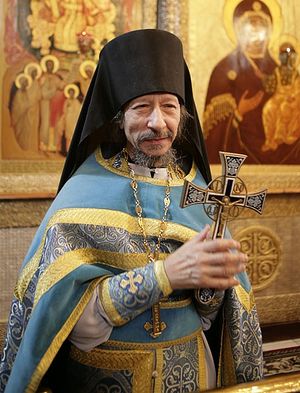 Question: Hello Father! Why don’t we observe the Wednesday and Friday fast during the week of the Publican and the Pharisee? Thank you! Respectfully, Olga.
Question: Hello Father! Why don’t we observe the Wednesday and Friday fast during the week of the Publican and the Pharisee? Thank you! Respectfully, Olga.
Answer by Hieromonk Job (Gumerov):
The parable of the publican and the Pharisee gives an image of the spiritual truth that God resisteth the proud, but giveth grace unto the humble (Js. 4:6). The Pharisees were representatives of the social-religious trend in Judea during the second century B.C. Their distinguishing characteristic was an intense zeal for observing the Law of Moses. Religious life requires that a person be attentive to himself, that he have moral sensitivity, humility, and pure intentions. If he doesn’t have these, a hardness of heart gradually creeps in on him. Then a pseudo-spirituality inevitably comes. The result is spiritual death. If instead of humility there is self-opinion and pride, instead of sacrificial love there is spiritual egoism, then it is not hard for the devil to take over such a person and make him an accomplice in his evil deeds. People who are unbelieving or spiritually inattentive do not even know or guess how often they do just what the enemy of our salvation wants them to do.
Synaxis of the Seventy Apostles
18. January 2018 - 13:47Commemorated January 4/17
The Synaxis of the Seventy Apostles was established by the Orthodox Church to indicate the equal honor of each of the Seventy. They were sent two by two by the Lord Jesus Christ to go before Him into the cities He would visit (Luke 10:1).
The Name of the Lord is a Fortress
16. January 2018 - 13:23 A Homily for the Feast of the Circumcision of the Lord. On the Naming of Jesus. On the Jesus Prayer
A Homily for the Feast of the Circumcision of the Lord. On the Naming of Jesus. On the Jesus Prayer
Today, on the eighth day after the Nativity of our Lord Jesus Christ, the Savior, according to the ancient sacred custom, is brought to the Temple of the Lord, and, as an eight-day-old infant, is dedicated to the Heavenly Father, enduring the cutting of His flesh for our sake, foreshadowing the shedding of His Blood on the Cross, indicating thereby His lifegiving death on the Cross. He endures suffering for our sake, manifesting His great condescension and love for mankind fallen into sin, purifying and sanctifying it. On this day is accomplished the naming of the Divine Infant by the righteous Joseph with the sacred name of Jesus—an earthly, human name, but announced to the righteous one by the angel descended from Heaven. From today, this name is adopted by the Divine Person of the Lord Jesus Christ, uniting within Himself His human nature like unto ours and His unseen Divine nature.
In Memoriam: Schema-Archimandrite Placide (Deseille)
15. January 2018 - 10:31The author of this memoir, Archimandrite Vasily (secular name: Pierre Marie Daniel Pasquiet), was born to a pious Catholic family in the town of Cholet in Maine-et-Loire, France, in 1958. After school he studied biology and agriculture at a college and worked on a farm. After reading some books on the Russian Orthodox theology the young man was tonsured a monk with the name “Vasile” in 1980 and in the same year joined the Greek Catholic Monastery of St. John the Baptist in Jerusalem. In the 1980s as a monk of the same monastery he continued his studies and developed a keen interest in the Russian Orthodox spirituality. In 1993 he moved to the Russian Gornensky Convent in Jerusalem and soon was received into Orthodoxy by Patriarch Alexei II of Moscow and All Russia. By Divine providence Fr. Vasily ended up in Russia where he visited many holy sites, met with the Elder Nicholas Guryanov and decided to stay in this country forever. Since 1994, with the blessing of Patriarch Alexei II, Fr. Vasily has served in the Chuvash Diocese of the Russian Orthodox Church [corresponding to the constituent Chuvash Republic of central Russia, in the middle Volga valley]. After his ordination in 1995 Fr. Vasily served in different localities of the Chuvash Republic: in the parish church of the Nikulino village, then at the Holy Trinity Monastery in the town of Alatyr and at the Church of the Iveron icon in the same town, etc. Thanks to the preaching and many other activities of Fr. Vasily, the spiritual and cultural life of parts of the Chuvash Republic was largely revived. Since December 2009, Fr. Vasily has been the Abbot of the Holy Trinity Monastery in Cheboksary (the capital city of the Chuvash Republic) and the chairman of the local Diocesan Commission for the Canonization of Saints.
***
On January 7, 2018, the feast of the glorious and radiant Nativity of Christ, Schema-Archimandrite Placide (Deseille)—a famous French ascetic and Orthodox theologian, founder of two Orthodox monastic communities in France—reposed in the Lord. The Pravoslavie.ru website asked Archimandrite Vasily (Pasquiet) to share his memories of the newly-departed ascetic, since he had met with Fr. Placide on many occasions, and it was under his (Fr. Placide’s) influence that he once converted from Catholicism to Orthodoxy.
O Lord Jesus Christ, Son of God, give rest to Thy servant Schema-Archimandrite Placide in Thy Kingdom!
Saint Nahum of Ochrid, the Disciple of Sts Cyril and Methodius, Equal of the Apostles
4. January 2018 - 12:13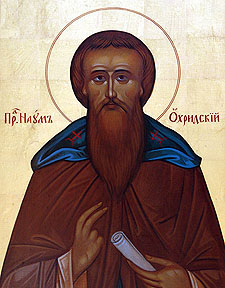 Saints Clement, Bishop of Ochrid, Equal of the Apostles, Naum, Sava, Gorazd and Angelar were Slavs, disciples of Saints Cyril and Methodius (May 11). They at first pursued asceticism in Moravia, where Saint Gorazd succeded Saint Methodius as bishop. He was fluent in Slavonic, Greek and Latin. Saints Clement, Naum, Angelar and Sava were priests.
Saints Clement, Bishop of Ochrid, Equal of the Apostles, Naum, Sava, Gorazd and Angelar were Slavs, disciples of Saints Cyril and Methodius (May 11). They at first pursued asceticism in Moravia, where Saint Gorazd succeded Saint Methodius as bishop. He was fluent in Slavonic, Greek and Latin. Saints Clement, Naum, Angelar and Sava were priests.
The Enlighteners of the Slavs were opposed by German missionaries, who had the support of the Pope and the patronage of the Moravian prince Svyatopolk. The struggle centered around the questions of the need for divine services in Slavonic, the Filioque and Saturday fasting. Pope Stephen VI prohibited the use of Slavonic in church.

